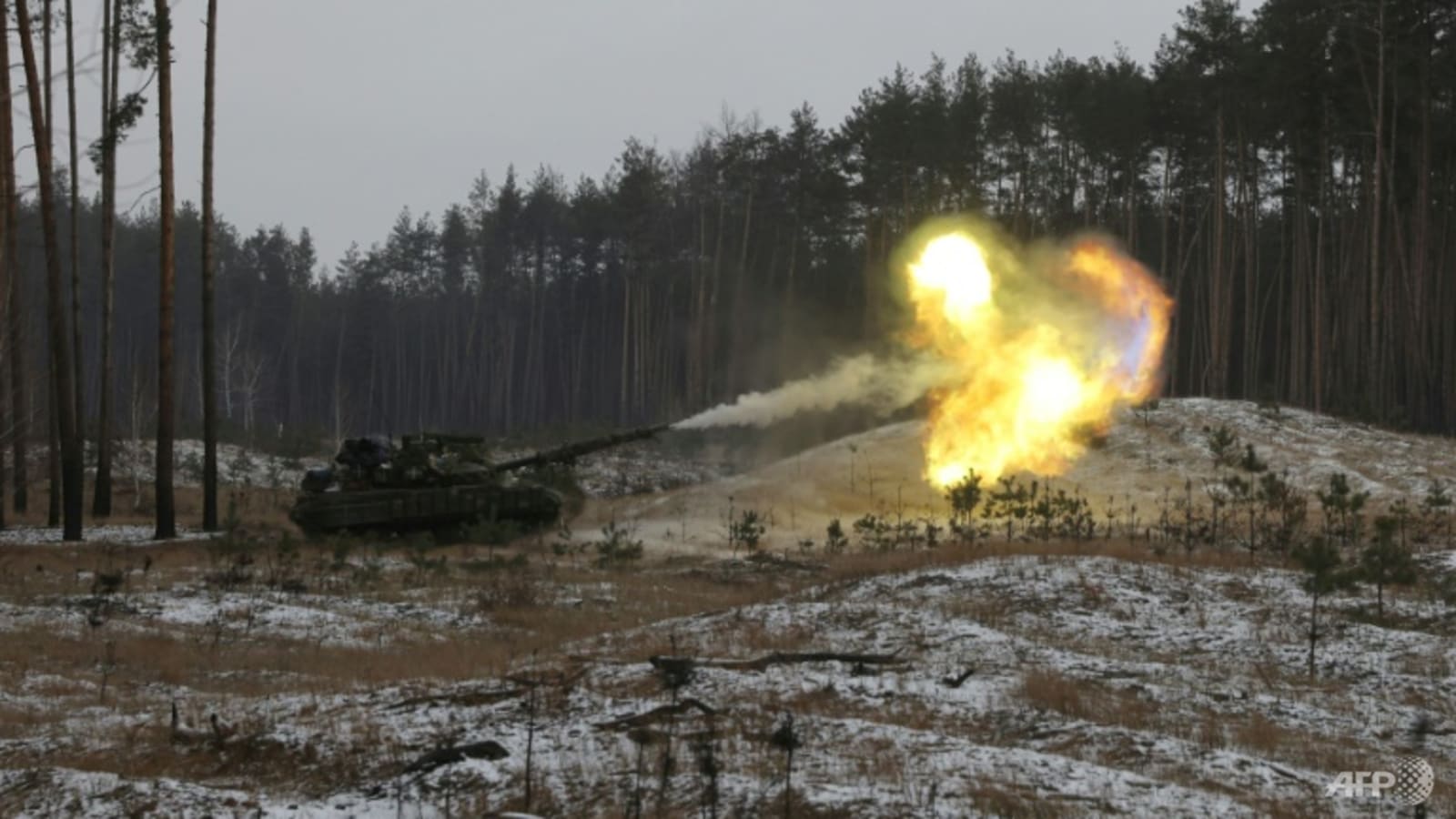RAMSTEIN AIR BASE: President Volodymyr Zelenskyy on Friday (Jan 20) urged Western allies to deliver tanks to Ukraine at a key defence conference in Germany, although the Kremlin denied the weapons would change anything on the battlefield.
Addressing the United States-hosted donor meeting at the Ramstein Air Base, Zelenskyy implored Western allies to “speed up” arms deliveries in the face of the Russian onslaught.
Partners needed “not to bargain about different numbers of tanks but to open that principal supply that will stop evil”, the Ukrainian leader said.
Make the meeting a “Ramstein of tanks”, Zelenskyy said, calling for future gatherings to “go down in history as a Ramstein of F16s and long-range missiles”.
“It is in your power to guarantee such artillery,” he said via video-link.
The meeting’s host, US Secretary of Defense Lloyd Austin, urged Western allies to “dig even deeper” to support Ukraine with military aid at a crucial time, noting that Russia is “running out of ammunition and suffering significant battle losses”.
“This is a decisive moment for Ukraine. The Ukrainian people are watching us, the Kremlin is watching us, and history is watching us,” he told the talks, gathering representatives from 50 countries to discuss boosting aid to Kyiv.
The Kremlin responded by accusing the West of harbouring a “dramatic delusion” that Ukraine can win on the battlefield, adding that the conflict was “developing in an upward spiral”.
GERMAN-MADE TANKS
On the eve of the Ramstein talks, allies including the US had already announced substantial new arms shipments.
The Pentagon on Thursday released a long list of US$2.5 billion worth of supplies for Ukrainian forces, including Bradley fighting vehicles, armoured personnel carriers, air defence systems, and tens of thousands of rockets and artillery rounds.
Britain announced it would send 600 Brimstone missiles, Denmark said it would donate 19 French-made Caesar howitzers, and Sweden promised its Archer artillery system, a modern mobile howitzer requested by Kyiv for months.
But all eyes are on long-sought German-made Leopard battle tanks, which Berlin has so far declined to provide and which the Kremlin has warned would amount to an “extremely dangerous” escalation if sent by the West.
At the annual World Economic Forum gathering in Davos, Chancellor Olaf Scholz told US Congress members that Germany would supply heavy tanks to Ukraine only if the US sent tanks too, a senior US lawmaker told AFP on Thursday.
But Berlin left the door open to letting allies supply Ukraine with tanks purchased from Germany. Defence Minister Boris Pistorius said late Thursday a decision would “become clear in the next few hours or tomorrow morning”.
Lithuanian Defence Minister Arvydas Anusauskas told AFP that “some countries will send” Leopard tanks to Ukraine, promising “more news tomorrow” at the talks.
Ramping up the call for the heavy weapons, senior Ukrainian presidential aide Mykhaylo Podolyak said it was “time to stop trembling at (Russian leader Vladimir) Putin and take the final step”.
“Ukraine needs tanks; tanks – the key to end war properly,” Podolyak said on Twitter.
CRATER
The US arms package also did not include the ATA long-range missiles that Ukraine has requested.
The missiles, which can travel up to 300km, could enable Ukraine to strike Russian supply routes and depots far behind the front lines that are not reachable with current HIMARS rocket systems.
But Western partners also fear that Ukraine could use long-range weapons to hit deep inside Russian territory or Crimea – a peninsula Moscow annexed in 2014 – despite Kyiv promising it would not do so.
Zelenskyy warned that time was pressing, saying the “war started by Russia does not allow delays”.
The most intense fighting of the nearly year-long conflict in recent months has centred around the eastern Donetsk region.
In Kramatorsk, a city in the industrial district under Ukrainian control, AFP journalists saw the aftermath of a Russian strike on a two-story school building.
The attack had carved a huge crater in front of the kindergarten, which had about 250 pupils and 70 staff before the war broke out.
Debris from the strike, which sparked a small fire and smashed windows, was strewn around the playground and lay near colourful murals on a school building.
“It’s hard to see the building like this, thinking about how much money and time it’s going to take to return it to what it was,” the kindergarten’s deputy director Margarita Oleksandrivna told AFP.

